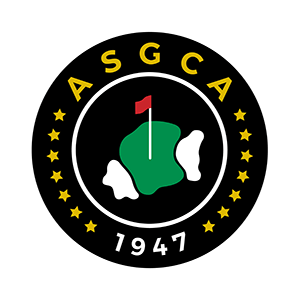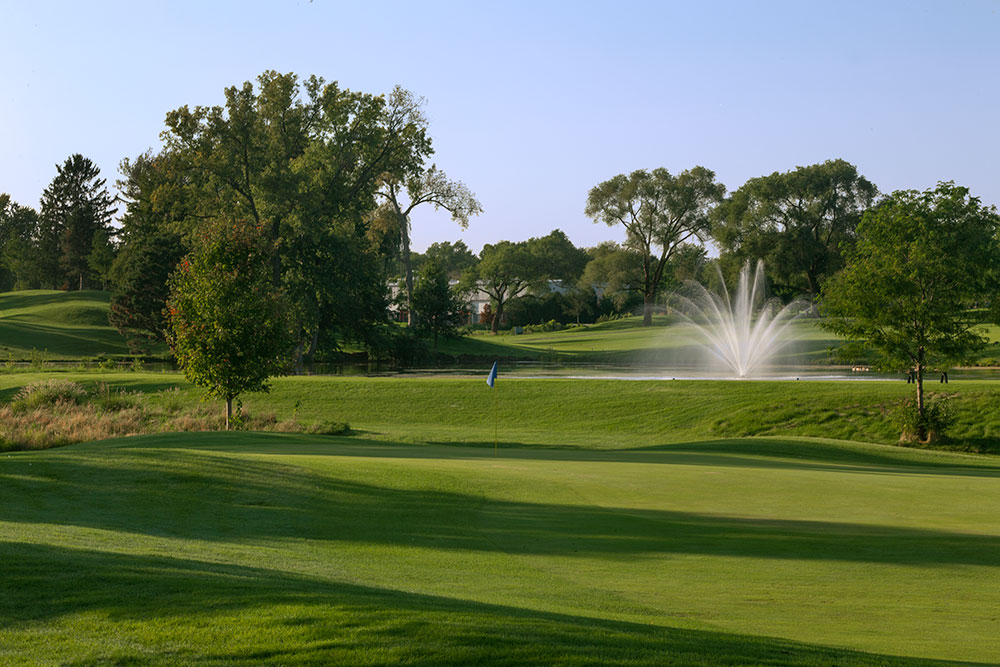A three-phase renovation project at Schaumburg (Illinois) Golf Club is 1/3 complete, thanks to the efforts of Lohmann Golf Designs – led by ASGCA Past President Bob Lohmann and Todd Quitno, ASGCA. The project is focusing on each of the club’s nine-hole courses separately.
Golf Course Architecture spoke with Quitno about the project, including the first phase, which included the Players course, originally designed by Langford and Moreau in the 1920s.:
Tell me about the two reworked holes on the Players course. Have these come out as planned and are you pleased with the results?
Hole 25 and 26 sit along the south border of the property and were previously routed as a par three and par four respectively. The problem with this layout was that the driving range extended from north to south, and the old 25th green was reachable from the range tee. Safety was a big issue, not to mention a pond sat between the 25th hole and the range which gobbled up range balls. This pond and the adjacent 25th fairway were also in a floodplain and prone to going underwater during heavy storms, then staying very soft for days and weeks after.
To resolve the problem, we flipped the two holes, making the 25th a par three and the 26th a par four. This allows the teeing area of Hole 26 to hug the south property line, which adds about 40-50 yards to the end of the range. We also rotated and moved the aforementioned pond to the west, between the 25th green and the 26th tee, further opening up the range and giving us room to add a new private teaching tee for lessons. This pond will serve as a flood area still, but is now situated between the holes rather than adjacent to them, and is equipped with a new bridge that will allow us to cross during even the worst storm events. The 25th green and 26th tees were also raised above the flood elevations and the pond edges will be planted with wetland and buffer grasses to filter runoff before it leaves the site.
I think the holes came out better than I even expected. The par three 25th is now a demanding par three of about 185 yards over the existing creek. The tees sit up high above a new retaining wall that separates them from the adjacent tees on Hole 20. The panorama from these elevated tees was a bit unexpected, as it allows you to look down the fairway of the 26th hole now as well, which is pretty cool. Once the wetland and buffer plantings grow up a bit around the pond they will disguise some of the fencing around the range. I think this view is going to just keep getting better.
As for Hole 26, this turned into one of my favourite holes of the renovation. Previously a long par three, the hole had an old landform/bunker leftover from the original Langford design along the left that had since been abandoned. By moving the tees back and making a short par four of the hole, we were able to bring that landform back into play as a fairway bunker. This feature now sets up the strategy of the hole as those who can carry it have a chance to kick towards or even onto the front of the green.
I know much of the focus of the recent work was on the tees and bunkers, with more risk/reward added. Do you feel this has been achieved?
Yes, I do. In fact, the tee work became somewhat of an add-on to the project. Originally, we weren’t going to do much with them. However, during the construction process, we determined that a square tee shape would really play well with the overall look of the course. So we stripped and resurfaced all of the tees to squares/rectangles. Where needed, we added forward tees to maximise the viability of the course for all users.
I think most interesting were the ‘life tees’ we added at the fairway fronts – a takeoff of the Longleaf Tee system. These were built up as flat pads in the fairway to give them some substance, but with minimal relief to minimise maintenance. They are completely grassed in fairway bentgrass and so are unnoticeable from the other teeing areas. Overall, the nine holes can play as short as 1,900 yards, and there are markers at approximately 300 yard intervals, up to the back tees at around 3,100 yards.
The bunkers were my favourite part of this project. I think the overall look of the course has changed dramatically with the new bunkering, and it will be fun to see how strategies develop as the course is opened for play and golfers learn their own tricks to navigate the obstacles we put in their way. The fairway bunkers were positioned intentionally at diagonals that extend further down the hole as you move away from the centre line. They also get deeper the further you move off the centre line, so the more you bite off and fail the greater the punishment. But at the same time, the banking slopes on their backside get more pronounced the more you move out and will kick the ball into ideal positions. So the more you bite off and succeed, the more chance for reward. This angled bunkering is a nod to Langford’s original bunker work on the course, but with our own twist. Some of that original bunker work still exists and will be restored and/or mimicked with future phases.
Around the greens, we also repositioned the bunkering and extended fairway roll-ons and roll-offs that have opened up new angles for golfers to approach. In locations where we pulled bunkers in front, we provided banking slopes on the opposite side to allow for creative access to tucked pins.
What would you count as the major differences golfers will notice on the course?
The course bunkering will be most immediately noticeable, but I think over time, the golfers are going to really appreciate the re-grassing efforts. Schaumburg has always been known for quick greens, but in the past has had some issues with consistency due to winter kill and other poa annua problems. The greens, which are completely rebuilt, are still generally the same on the surface save for some relatively minor slope adjustments. The difference will be the new grass, which is Pure Distinction. This will be more dense and firm and roll true, which always makes the greens play/seem quicker, even if they’re maintained at the same heights as before. I’m looking forward to those surfaces.
To the Park District’s credit, they also elected to regrass the fairways with Crystal Blue Links, which allowed us to expand the fairway landing areas and set up the new bunkering more seamlessly. I think these two items, along with the bunkering and new tees, are going to give Schaumburg a private club quality that will be unrivaled in the local public course market.
How has work gone on the range?
The range is fantastic! In an ideal world, we’d still love to have a few more acres just to have a little more breathing room, but we’ve maximised the usage of a relatively small space. By moving the 19th tee to the west a bit, we were able to make the range tee 75 per cent bigger. We’ve also added a 9,500 square foot putting green that adorns the entry to the facility, so you see a golf ‘lawn’ immediately upon your arrival. Another green of similar size will be added in phase three. On the south end of the range we also have two large lesson tees and a private short-game area for the teaching pros. It’s a really nice setup and good overall use of the space.
When is the next phase of work set to commence?
Phase two will begin once Phase one is ready, so that we always have 18 holes open for play. We are shooting July 2018 at the latest and hoping for sooner. Fingers crossed that the spring weather is as good as our fall has been, as we’ve gotten some unbelievable growth so far. As you can imagine, there are a lot of eager golfers and a lot of premature requests to get out and play the new nine!

